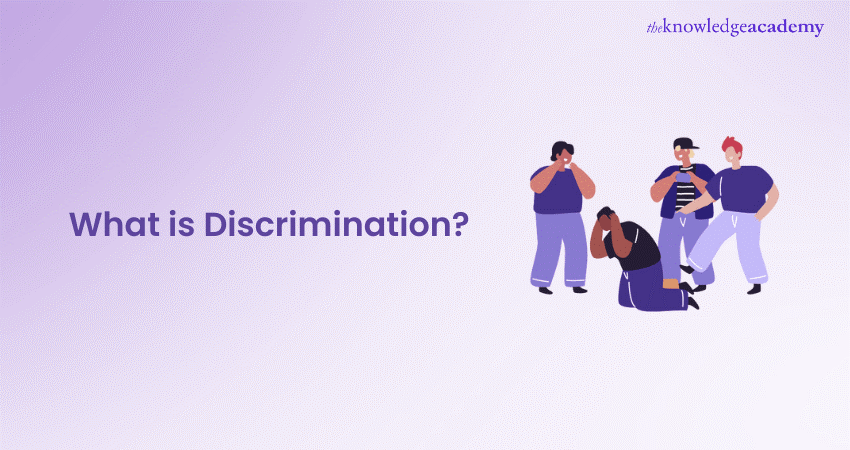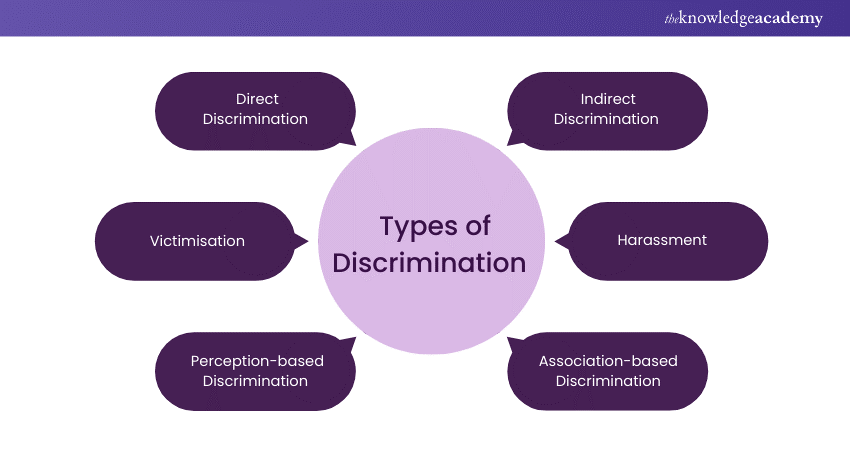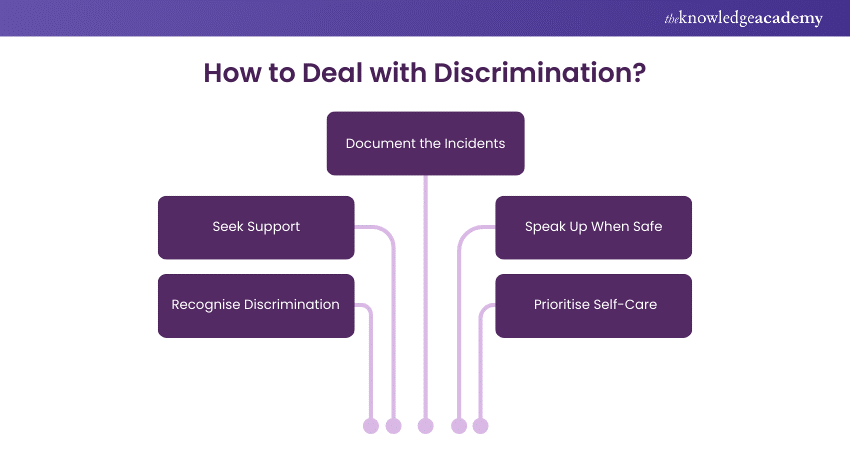We may not have the course you’re looking for. If you enquire or give us a call on +1 6474932992 and speak to our training experts, we may still be able to help with your training requirements.
Training Outcomes Within Your Budget!
We ensure quality, budget-alignment, and timely delivery by our expert instructors.

Do you consider discrimination unlawful against certain individuals? If yes, you're not the only one with such a perception. As per The Migration Observatory Report, UK minority migrants expressed their concern about being unsafe (19%), insulted (15%), and avoided (10%) due to their different backgrounds. In this blog, we'll explore What is Discrimination, its types, common places of occurrence, and how you can deal with this injustice.
Table of Contents
1) What is Discrimination?
2) Different Types of Discrimination
3) Common Places Where Discrimination Occurs
4) How to Deal With Discrimination?
5) Conclusion
What is Discrimination?
Discrimination is a harmful practice of differentiating or mistreating someone only because they are from separate ethnicity, gender, age, and other personal characteristics. It could involve not giving a job or prioritising someone else for a specific job opening.
For instance, your organisation has an opening for a Receptionist. Three candidates, one from the UK, another from Nigeria, and one from Kenya, have all the qualifications, and they have cleared the final stages along with the UK candidates.
However, the UK candidate does not possess relevant experience or education but is a relative of the CEO. Considering this, the interviewer finally chooses the UK candidate, prioritising candidates. Likewise, there are many such examples.
Different Types of Discrimination
Depending on how people are mistreated, discrimination can take several forms. Below, we have described some of them to help you get a clearer picture.

1) Direct Discrimination
Direct Discrimination is when people are treated unfairly or differently for their belonging to separate backgrounds, genders, religions, etc. For example, a company may allow only men to apply for a particular job opening.
2) Indirect Discrimination
Indirect discrimination refers to an organisational rule or policy that indirectly impacts a particular race or group of individuals. For instance, the company may require all job applicants to come clean-shaven the following day in the office. This policy can be unfair to particular religious groups that grow a beard as a staple of their religious practices.
3) Victimisation
Victimisation occurs when an individual is harmed only as a result of their complaint against the offender for their maltreatment in a public or professional setting. For instance, someone who has filed a complaint against discrimination is not allowed to attend a work function.
4) Harassment
When someone is made fun of or harassed due to their gender, race, or other distinguishing characteristics, that behaviour is known as harassment. This includes disparaging remarks and nicknames, as well as humour.
5) Perception-based Discrimination
Perception-based discrimination is another type of discrimination that occurs when you have a connection with a particular individual. For example, a restaurant may refuse to serve you because you are from a separate ethnicity.
6) Association-based Discrimination
This happens when someone behaves poorly with you because they have an incorrect perception of you. For example, an estate agent assumes you are gay based on your appearance or clothing and refuses to rent you a flat.
Become a law enforcement expert with our Commercial Law Training – join now!
Common Places Where Discrimination Occurs
There are many common places where discrimination is prominent. Below, we have listed a few places where it predominantly happens.
1) Workplace: Discrimination can occur in various settings, and the workplace is one of the prevalent sites. Employees may face unfair treatment simply because they are from a specific race, gender, age, religion, or other personal characteristics.
2) Educational Institutions: Educational institutions are one more frequent site for discrimination. Students may get affected by bias from teachers or classmates based on their ethnicity, disability, or sexual orientation.
3) Public Services and Facilities: Discrimination is also seen predominantly in public areas such as hospitals, government offices, and public transport. Individuals might face unfair treatment when accessing healthcare, legal support, or housing services.
4) Retail and Hospitality Services: Retail and hospitality services are one among the most frequently encountered sites for discrimination. People may refuse service, followed around in stores, or treated disrespectfully due to their race, appearance, or socioeconomic status.
5) Online Spaces: Lastly, online spaces have become predominant sites for discriminatory behaviour. This includes cyberbullying, harassment, and hate speech on social media platforms, forums, and digital communities.
Transform into an advanced employment law practitioner with Employment Law Training – register today!
How to Deal with Discrimination?
The positive aspect is it can be dealt with through a cautious and consistent disciplinary approach. Below, we have listed those steps:

1) Recognise Discrimination: You should immediately recognise when you face mistreatment due to race, gender, or other personal characteristics.
2) Seek Support: Contact your friends, family, or colleagues and talk about your experience. You can even consider professional therapies and support.
3) Document the Incidents: Keep a detailed record of discriminatory actions, such as dates, times, and specifics of happenings.
4) Speak up When Safe: Whenever you feel comfortable and safe, address the person or organisation responsible for the discrimination against the organisation.
5) Prioritise Self-care: Engage in activities prioritising relaxation to maintain mental and physical health while dealing with discrimination.
Lead the fight against bribery—register today for our Anti-Bribery Training!
Conclusion
We hope you understood "What is Discrimination?" Discrimination is an awful practice that still affects diverse groups of people. We can work toward a more equitable society by recognising its forms and knowing how to respond. To effectively address discrimination, seeking help, documenting incidents, and prioritising self-care is essential. Always remember that the same God creates every human being who carries the same blood and biological attributes. They should be treated and respected equally regardless of their skin tone and race.
Discover expert talent management strategies with our Talent Management Training- sign up today!
Frequently Asked Questions

Discrimination can pave the way for human rights violations by denying individuals access to fundamental rights only because they are of a different race, gender, etc.,

The crucial reasons that result in discrimination are race, gender, religion, or other personal characteristics.

The Knowledge Academy takes global learning to new heights, offering over 30,000 online courses across 490+ locations in 220 countries. This expansive reach ensures accessibility and convenience for learners worldwide.
Alongside our diverse Online Course Catalogue, encompassing 19 major categories, we go the extra mile by providing a plethora of free educational Online Resources like News updates, Blogs, videos, webinars, and interview questions. Tailoring learning experiences further, professionals can maximise value with customisable Course Bundles of TKA.

The Knowledge Academy’s Knowledge Pass, a prepaid voucher, adds another layer of flexibility, allowing course bookings over a 12-month period. Join us on a journey where education knows no bounds.

The Knowledge Academy offers various Employment Law Courses, including the Employment Law Training, Commercial Law Training Course, and Anti-Bribery Training Course. These courses cater to different skill levels, providing comprehensive insights into Employee Rights and Responsibilities.
Our HR Resources Blogs cover a range of topics related to human resources management, offering valuable resources, best practices, and industry insights. Whether you are a beginner or looking to advance your HR skills, The Knowledge Academy's diverse courses and informative blogs have got you covered.
Upcoming HR Resources – Learn about Human Resources Batches & Dates
Date
 Direct and Indirect Discrimination Training
Direct and Indirect Discrimination Training
Fri 17th Jan 2025
Fri 21st Feb 2025
Fri 4th Apr 2025
Fri 6th Jun 2025
Fri 29th Aug 2025
Fri 24th Oct 2025
Fri 26th Dec 2025







 Top Rated Course
Top Rated Course



 If you wish to make any changes to your course, please
If you wish to make any changes to your course, please


